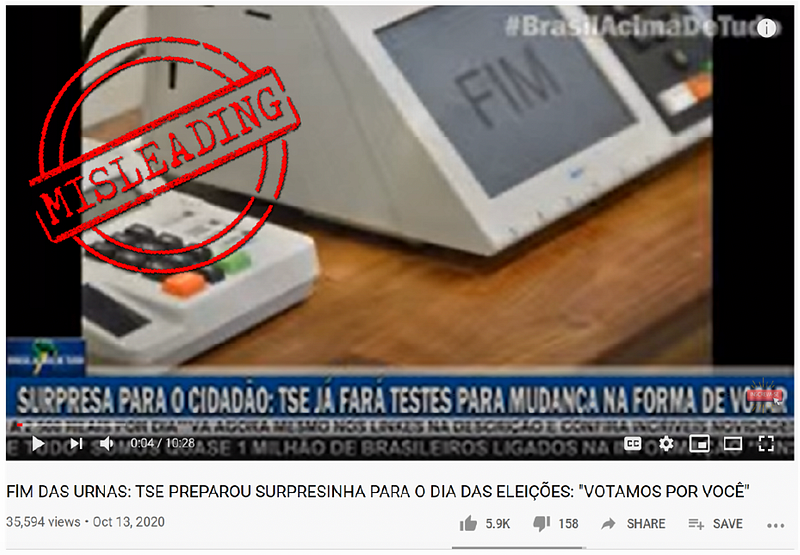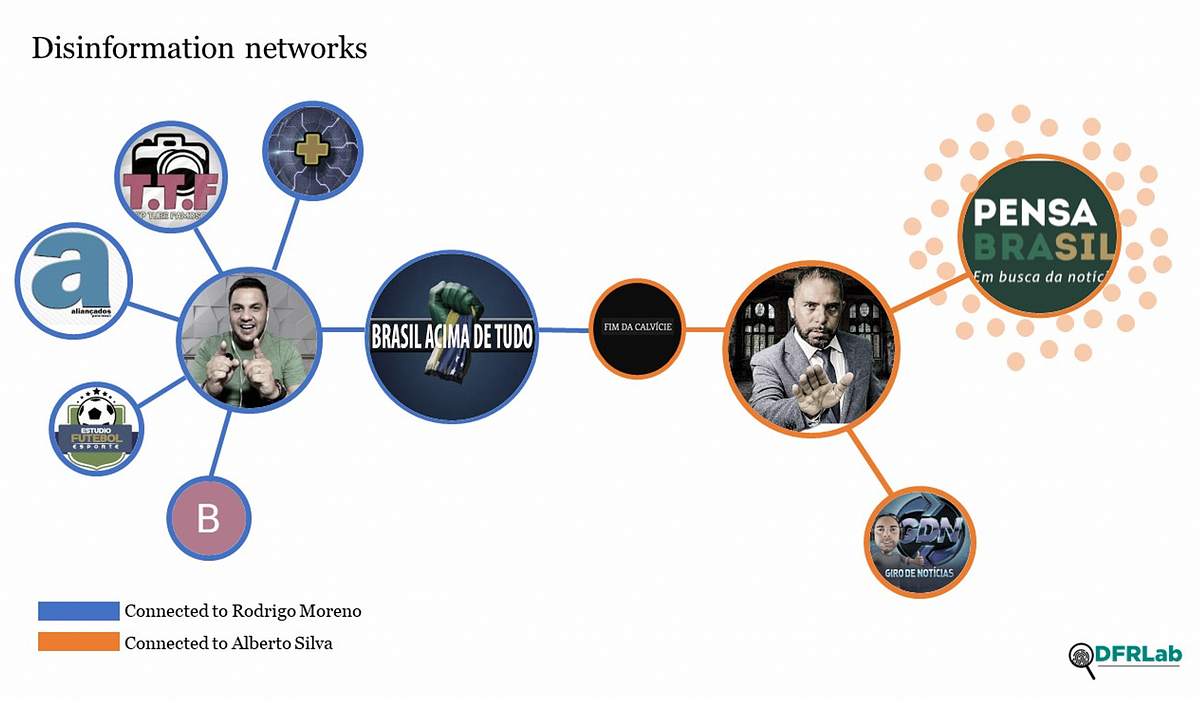Well-known disinfo spreader on YouTube reappears ahead of Brazilian local elections
YouTube channel peddling electoral disinfo and
Well-known disinfo spreader on YouTube reappears ahead of Brazilian local elections

YouTube channel peddling electoral disinfo and baldness cures connected to network previously investigated by authorities

A monetized YouTube channel spreading electoral disinformation in Brazil ahead of regional elections is connected to a well-known disinformation network that has already been subject to investigation by the Brazilian Supreme Court. The channel, Brasil acima de tudo, hawked a “cure for baldness” marketed by Alberto Silva, a pro-Bolsonaro blogger who also runs a network of “fake news” websites called Pensa Brasil. Silva was implicated in the Supreme Court investigation regarding the coordination and financing of “anti-democratic acts” against Brazil’s democratic institutions by some of President Jair Bolsonaro’s supporters and associates.
Brazil is holding municipal elections on November 15, 2020. It is the first time Brazilians will cast their votes since the 2018 presidential election, which was marred by misinformation, disinformation, and inauthentic influence campaigns.
Legislators, tech companies, and the country’s Electoral Court took steps to deter election interference, misinformation and disinformation, but false and misleading rumors are already circulating ahead of the vote. That some of the same actors implicated in 2018 continue to operate in the 2020 election cycle, however, points to at least a partial failure of those policies.
On October 13, 2020, the YouTube channel Brasil acima de tudo (“Brazil above all” — a reference to President Jair Bolsonaro’s slogan), with roughly 608,000 subscribers, published a video with a misleading title about the upcoming local elections. The video was titled, “End of ballots: Supreme Court prepared a ‘little surprise’ for election day: ‘we vote for you.’” This falsely implied that voters would not be able to cast their votes. The video mixed accurate information about a pilot project for online voting with the narrator’s commentary that online voting might be subject to fraud. As of October 20, 2020, the video had more than 35,000 views on YouTube.

Brazil adopted electronic voting in 1996, and there has never been any evidence of large-scale electoral fraud. In the 2018 general election, disinformation about alleged fraud using electronic voting flourished, and then-candidate Jair Bolsonaro cast doubt on the system, demanding a return to print voting. This narrative has re-emerged ahead of the November 2020 municipal elections, mostly driven by Bolsonaro supporters.
Brasil Acima de Tudo is monetized, meaning YouTube attached ads to videos uploaded to the channel and the owner of the channel received a portion of the ad revenue. The channel is also connected to at least four other active channels and an inactive one, all linked in the channels’ About sections (see graph below). The most prominent of these is Top Tube dos Famosos, which has more than 1 million subscribers. Although the name suggests that the channel focuses on celebrities, the videos are mostly pro-Bolsonaro, and many of them contain false or misleading information.
The person behind these channels uses the name “Rodrigo Moreno” — but his real name is Dgeney Rodrigo Passos Alvarenga. He describes himself on Twitter as a “journalist, radio host, singer, reporter and host of one of the biggest YouTube news channels, Top Tube dos Famosos.” Moreno is also a gospel singer from Poços de Caldas, in the state of Minas Gerais in southeast Brazil.
In addition to YouTube’s monetization system, Moreno uses other techniques to generate revenue for his channel. At the end of some videos, he adds a clip marketing sponsored products, and includes links to the seller in the video description. The misleading video about voting, for example, culminated with an ad for a product promising a “secret way” to cure baldness.

In the promotional clip, Moreno instructed people to access a PDF with further advice on a cure sold for 98 Brazilian reais (around $18.00 USD) and marketed by Alberto Silva, who also lives in Poços de Caldas.

Silva is a pro-Bolsonaro blogger and YouTuber who owns a network known as Pensa Brasil (“Think, Brasil,” named after a website he registered) that includes some 30 websites. He currently has a YouTube channel called Giro de Notícias. His address was raided by the Federal Police in June 2020, as part of the Supreme Court investigation into financing of anti-democratic rallies in support of the right-wing. Since the case is sealed, there is little public information about the accusations against Silva.
Silva was sued at least two times for publishing false information, however. He claimed, for instance, that singer Gilberto Gil had said offensive things to former judge Sergio Moro, who directed the Operation Car Wash corruption probe that led to the arrests of multiple prominent politicians and businessmen in Brazil. Silva was also convicted of spreading electoral disinformation targeting a candidate in 2018.

In 2017, newspaper Folha de S. Paulo investigated Silva’s network of websites and concluded that his motivation was mostly financial, as he spread false and misleading sensational articles to draw clicks (and thus, ad revenue) to his websites. The newspaper compared the city of Poços de Caldas, where Silva is based, to the Macedonia town of Veles, notorious for hosting a cottage industry of Macedonian troll farms that targeted an American audience with political clickbait amid the 2016 elections.
Silva continues to use YouTube for profit — monetizing channels that mix incendiary political disinformation that undermines faith in elections with hawking “snake oil” health and wellness products, such as a cure for baldness. He is a prime example of how some of the most persistent disinformation actors can have a mix of financial and political motivations — and that any efforts to deter them should work to prevent them from profiting off of disinformation for personal gain.
Luiza Bandeira is a Research Associate, Latin America, with the Digital Forensic Research Lab.
Follow along for more in-depth analysis from our #DigitalSherlocks.

